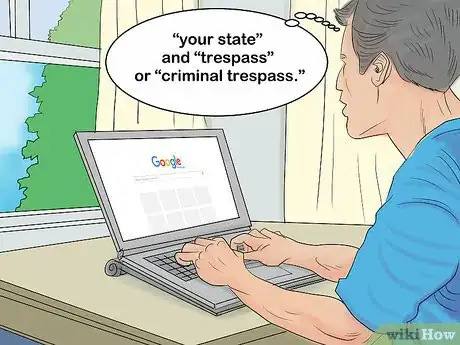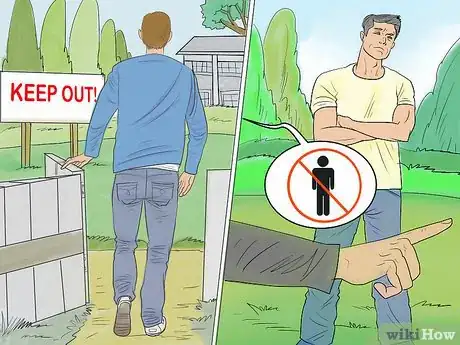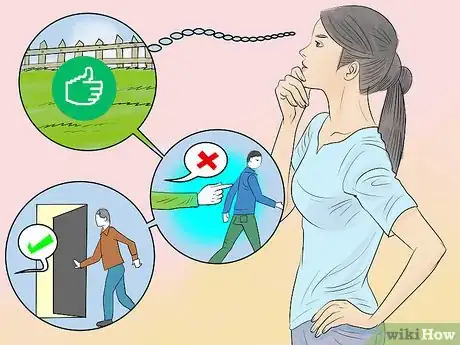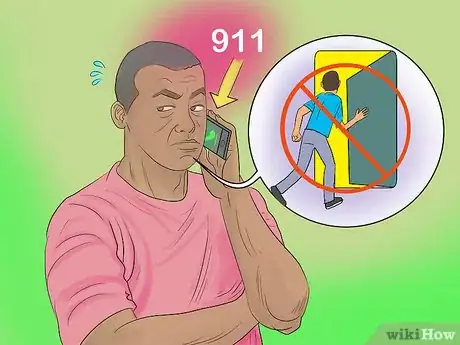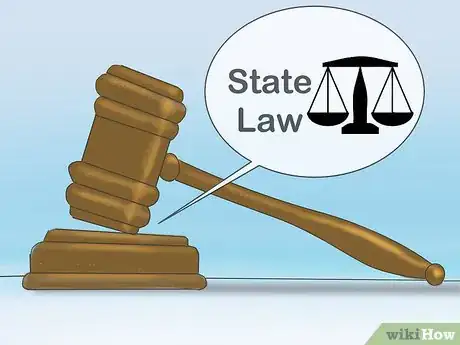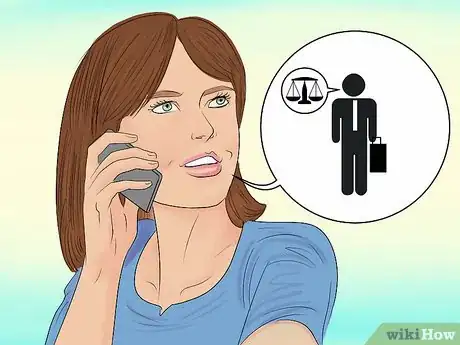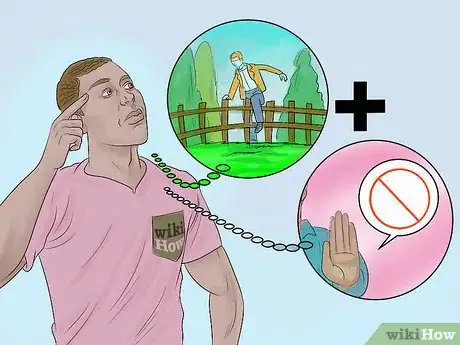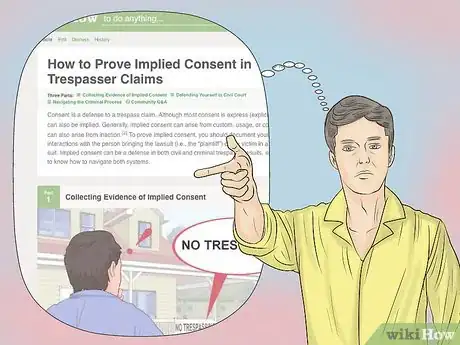This article was co-authored by Clinton M. Sandvick, JD, PhD. Clinton M. Sandvick worked as a civil litigator in California for over 7 years. He received his JD from the University of Wisconsin-Madison in 1998 and his PhD in American History from the University of Oregon in 2013.
There are 8 references cited in this article, which can be found at the bottom of the page.
This article has been viewed 27,312 times.
Criminal and civil trespass are largely the same. The key difference is who enforces the law. With criminal trespass, the law is enforced by police and prosecuting attorneys, whether state or local. If you are convicted of criminal trespass, you may face jail time or have to pay fines. With civil trespass, a private citizen enforces the law by bringing a lawsuit. If you lose the lawsuit, you typically have to pay the other person money.[1]
Steps
Identifying Criminal Trespass
-
1Read your state’s law. Your state publishes a criminal code which describes all crimes, including criminal trespass. You can probably find your state’s criminal code by searching online. Type “your state” and “trespass” or “criminal trespass.”
- You could also visit a law library if one is nearby. There may be a law library in your county courthouse. Stop in and ask.
- Also, a nearby law school might let you use their library. Ask the librarian to show you the law on criminal trespass.
-
2Meet with a lawyer. The easiest way to understand criminal trespass is to meet with a criminal defense lawyer. He or she can listen to your situation and tell you whether or not the conduct meets your state’s definition of criminal trespass.
- You can find a criminal defense attorney by contacting your state or local bar association. A bar association is a professional group of lawyers. Often, they run referral programs. If you contact the bar association, you can get the name of one or more lawyers to call.
- Also try to get referrals from people who have used a lawyer recently. Ask if they would recommend the lawyer. If so, take down the name and schedule a consultation.
Advertisement -
3Identify examples of criminal trespass. The laws vary by state, but you can identify some common situations which generally qualify as criminal trespass. For example, the following would be criminal trespass in most states:[2] [3]
- Someone enters property after being warned not to. The trespasser could be warned orally or by the presence of “No Trespassing” signs or a fence.
- Someone remains on the property after being asked to leave. If the person fails to leave promptly, then they are committing criminal trespass.
-
4Think about defenses. The state prosecutes people for criminal trespass. If you are convicted, you could be fined or sentenced to jail. You should think about whether you have any of the following defenses:[4]
- your trespassing did not substantially interfere with the owner’s use of the property
- you left the property immediately after being confronted
- you personally had consent or the property was actually open to the public
-
5Report criminal trespass. If someone has trespassed on your property, then you should call the police and report it. By reporting the trespass, you are not guaranteed that the person will be prosecuted. The decision whether to prosecute resides with the prosecutor. However, you can still report the trespass to the police.
- You may have to fill out a “criminal trespass affidavit.” For example, if someone is squatting on your property, you will give the police permission to enter your property and evict the person. You give your permission by completing the affidavit.[5]
Identifying Civil Trespass
-
1Read your state’s law. Civil trespass was initially created by judges. It is a “tort,” which means it is a civil wrong.[6] Torts are prosecuted by private citizens, not the state. For example, if you enter your neighbor’s property without permission, then your neighbor (not the district attorney) sues you in court for civil trespass.
- Although judges initially created the tort of trespass, your state may have codified civil trespass law in a statute.
- You can find the statute the same way that you would find the criminal law statutes: search online or visit your nearest law library.
-
2Contact a lawyer. An attorney can explain the finer points of civil trespass to you. He or she can also advise you about what evidence you would need to successfully bring a lawsuit. You can find a lawyer by contacting your local or state bar association.
- Once you have the name of a lawyer, call and schedule a consultation.
-
3Identify the elements of civil trespass. Civil trespass should be the same in most states. The following are generally elements of civil trespass:[7]
- someone knowingly entered onto land
- they entered without the consent of the landowner
-
4Identify defenses. Every state recognizes that in certain situations a person should be able to enter another person’s property. Although these defenses will differ by state, common defenses include:
- You are given express (verbal) or implied consent to enter the property.[8]
- The law gives you a right to enter the property. For example, you may have an “easement” to use someone’s driveway in order to access your landlocked property.
- You enter the property out of necessity.[9] For example, if you are being chased, you might jump someone’s fence and hide in their backyard as a way to seek safety. The law typically allows you to temporarily trespass to the extent necessary to secure your safety.
-
5Talk to a lawyer about whether to sue. If someone trespasses on your property, then you have the option of bringing a civil lawsuit. You can sue even if the state chooses not to sue for criminal trespass.
- Trespass is usually a low priority for most state and county prosecutors. Accordingly, they might tell you that they won’t arrest or prosecute unless the person trespasses a second time.[10]
- However, even if the state doesn’t want to prosecute, you can bring a civil lawsuit. Of course, you have to pay for the costs of your lawsuit. Discuss with a lawyer whether bringing a civil lawsuit would be a good deal.
References
- ↑ http://realestate.findlaw.com/land-use-laws/trespassing-basics.html
- ↑ http://www.criminaldefenselawyer.com/crime-penalties/federal/Tresspassing.htm
- ↑ http://www.illinoislegalaid.org/index.cfm?fuseaction=home.dsp_content&contentID=7596
- ↑ http://www.legalmatch.com/law-library/article/criminal-trespass-lawyers.html
- ↑ http://directives.chicagopolice.org/forms/CPD-21.718.pdf
- ↑ http://realestate.findlaw.com/land-use-laws/trespassing.html
- ↑ http://realestate.findlaw.com/land-use-laws/trespassing-basics.html
- ↑ http://realestate.findlaw.com/land-use-laws/trespassing-basics.html
- ↑ http://trespass.uslegal.com/defenses/
